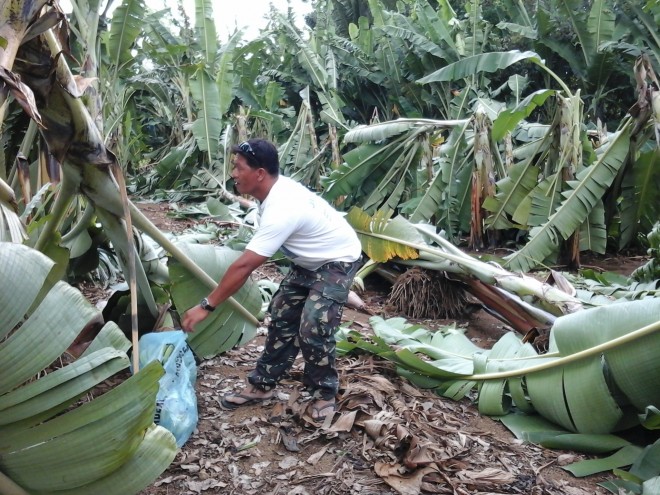Twisters ravage homes, crops in parts of North Cotabato

Farm worker checks the banana trees devastated by twister on Monday evening in Barangay Manongol, Kidapawan City on Monday evening. At least 5000 hills of banana trees in its productive stages were severely damage in the said incident. WILLIAMOR MAGBANUA
KIDAPAWAN CITY, Philippines – Twisters have been hitting parts of North Cotabato for the past few weeks and ravaged homes and whatever crops left standing by the dry spell that was being experienced in the province for months now.
The latest to be hit by the phenomenon, the seventh to hit the province this month alone, was Barangay (village) Manongol in this city.
At least 5,000 hills of banana plants were damaged by a twister that descended in the said village on Monday evening but no human casualty was reported.
It was the third twister to hit the city this month, officials confirmed.
On Monday last week, another twister also hit the city and damaged some P2 million worth of banana fruit-bearing plants in Barangay Paco.
Article continues after this advertisementDaniel Curambao, a banana plantation owner, said only five percent of the 7-hectare farm he owned was spared by the powerful tornado.
Article continues after this advertisementPrior to the Paco twister, 27 houses were also damaged by a similar occurrence in Barangay Magatos in Kabacan town, according to Mayor Herlo Guzman.
In Mlang town, another powerful twister also tore apart 15 houses and 11 school buildings in two villages on April 12.
Hundreds of banana plants were also felled down by the twister, the second to hit the town, according to Mayor Joselito Piñol.
In Alamada town, another twister also damaged 30 houses during the second week of April, according to the town’s disaster response office.
A government meteorologist assigned at the Cotabato City station of the Philippine Atmospheric, Geophysical and Astronomical Services Administration (Pagasa) said the dry spell being experienced in North Cotabato was a contributory factor to the twister occurrences.
“When there is extreme heat, cumulu nimbus clouds easily form. This is how a twister originates,” the meteorologist, who requested anonymity for lack of authority to speak to media, said.
He said extreme heat, such as the dry spell being experienced in North Cotabato, also increases the air’s moisture content (humidity). When this warm air collides with cooler air, a twister could form, the source added.
“Sometimes, there will be hailstorm such as the ones reported last year,” the source said.
But other areas experiencing dry spell have not reported similar occurrences to date.
The meteorologist said the topography of an area was also a factor.
In the North Cotabato, most of the twister-hit areas have vast plains.
In Davao del Sur, Gov. Claude Bautista announced the declaration of a state of calamity as he urged his allies to forget politics for the moment and concentrate on efforts to help farmers suffering from the effects of the dry spell.
Marivic Hubac, Bautista’s executive assistant, said initial data collated showed that about 7,000 hectares of agricultural crops had already been damaged by the dry spell in the province and in the newly-created province of Davao Occidental.
“Partial report from the agriculture office indicated that there are more or less, 500 hectares of rice, 2,000 hectares of corn, 500 hectares of banana and about 3,000 hectares of coconuts damaged. As of now, assessment is still going on through the agriculture office of the respective municipalities,” she said in a text message.
Bautista said the plight of the farmers was more important than politics. The election period, he said, was still months away and until then, no one should talk about it.
Earlier, Sta. Cruz, Davao del Sur Mayor Joel Ray Lopez said the league of municipalities in the province had come up with a resolution urging Bautista to run for re-election.
Lopez admitted that the resolution was passed amid reports that Bautista will not be running in the Davao del Sur gubernatorial race, but will stand for election in Davao Occidental, which is made up of the former Davao del Sur towns of Sta. Maria, Malita, Jose Abad Santos, Don Marcelino and Sarangani.
Magsaysay, Davao del Sur Mayor Arthur Davin said Bautista, a native of Malita, should run for a second term in Davao del Sur to continue the projects he had started.
Asked if he really intended on running in Davao Occidental, Bautista said there are more pressing issues to attend to and politics is not one of these.
“Let us focus on how to help our farmers for the moment,” he said, adding that a state of calamity had now been declared due to the effects of the dry spell.
In Maguindanao, the provincial board also declared a state of calamity as the dry spell has now affected more than 2,000 farmers across 36 towns, Gov. Esmael Mangudadatu said.
Mangudadatu said the declaration will pave the way for the use of the calamity fund for mitigating measures for affected residents, who have been suffering from the effects of the recent all-out war launched by the military against the Bangsamoro Islamic Freedom Fighters.
Damage to crops, he said, has now reached over P100 million and the situation worsens by day.
“We were displaced and now we lost our farms,” Bai Dido Dilangan, 49 of Barangay Meta, Datu Unsay, Maguindanao said.
“We fled because of armed conflict, when we returned home our corn fields turned from green to brown, no chances of recovery,” she said.
Her husband Adil said they were looking forward to the government intervention that Mangudadatu had announced. Allan Nawal, Williamor Magbanua, Edwin Fernandez and Orlando Dinoy